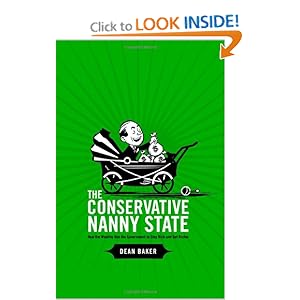Takeaway: There are many different ways to view economics. It is good for us to wrestle through alternative views and you do not have to agree with something to learn from it.
Purchase Links: Paperback, Free PDF Version, Free Audible.com Audibook
I like to read books on economics. I know that may be strange, but very few areas of study and research have more direct impact, but less general understanding by the average person than economics. The more I read, the more free market my general belief system moves. But I am moving not only generally more free and open market, but less protectionist and US focused. I reviewed the book Enough on global hunger (my review) recently. And Enough clearly showed that US protectionism and lack of free trade around agriculture is a major influence of global hunger and the general economic status of developing countries, especially those in Africa.
The Conservative Nanny State is an attempt at reading a book that I think I will significantly disagree with (and I do quite often) but has many important reminders about the weaknesses of the US version of conservative economic policy. Essentially the thesis of this book is that conservatives are against government intervention except when it benefits the rich. This is a vast oversimplification of reality, but there are some strong arguments for that simple statement. If you are for a smaller government or free trade this is a good book for you. Instead of being anti-free trade or for a larger government, it is actually more free trade and for a different type of government than what most conservatives really push for.
One chapter is about how government policies (around immigration, licensing, standards and competition) help to move in a free market direction for low and middle income jobs but are much more restrictive and protectionist for upper income jobs. There are a lot of suggestions about how to be more free market in the upper income job areas as well, but many suggestions are politically untenable. The point of this book is not political feasibility of any particular policy, but simply the understanding that there are often significant double standards for rich and poor.
Another chapter is about the corporation. The author asserts that the corporation is a government legal creation (because without government recognition of the corporation it would not exist). And because the government recognizes corporations (which the author is strongly in favor of), corporations and people that buy shares in corporations need to recognize the benefits that they receive from the government created legal status of corporations (primarily legal and financial limited liability). So discussions of taxation and responsibility of corporations should start with the benefits that government confer on corporations instead of assuming that corporations have no relationship or benefit from government. The author repeatedly asserts that corporations are voluntary. If they do not like the tax arrangements of being a corporation, they could become a partnership or other legal entity. It seems to be a bit hyperbolic argument, but there is a real kernel of truth at the root.
Another chapter shows how the government has started to work for banks and finance institutions (primarily through a discussion of the bankruptcy reform laws of 2005, but also through the IMF and other financial regulations). As you might guess by this point, the author believes that banks should have to suffer for their own bad credit risks and that the government should not be in the role of collection agent.
One of the strengths of this book is that it tries to show that the way that we currently do things are not necessarily the best or only way that they can be done. A chapter proposes alternatives to the patent and copyright systems. Some of the ideas are completely off the wall, but others show that even if they are not politically viable because of entertainment and drug lobbies, they are at least intellectually viable. If we were creating new systems right now it is unlikely that we would choose the current copyright and patent systems. The current system are not the most efficient, and necessarily the best way to promote innovation and creativity.
This is one of the more challenging books on economics that I have read. Not because of the content, but because of the implications of the content. No matter what your position on economics, this book will break some of your bubbles and push you to think deeper about the long term implications of the current two party system and the weaknesses of current economic thought.
________
The audiobook is free on Audible.com, so a good way to try out the Audible.com service. But the reading is DRY!!! The book is actually quite snarky and funny, but I think much of the snark and humor gets lost in the reading.
